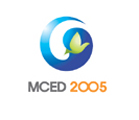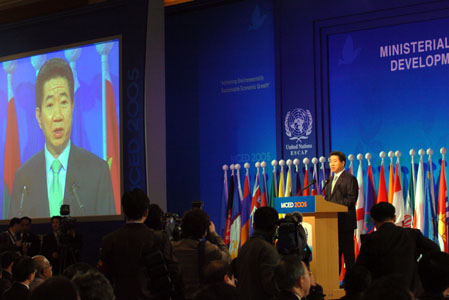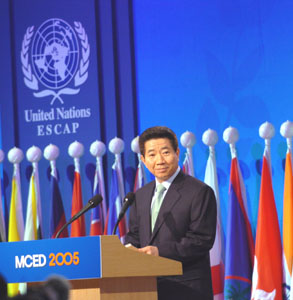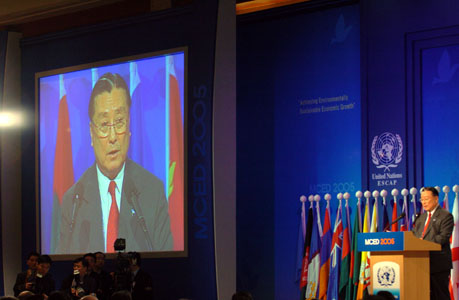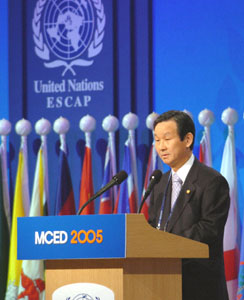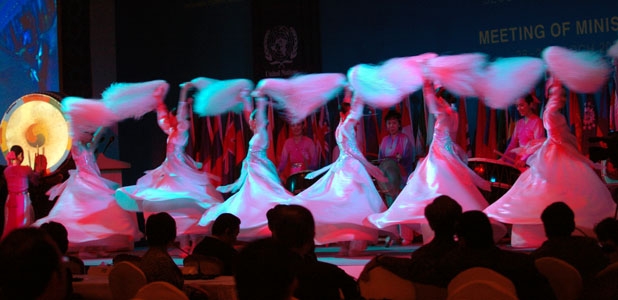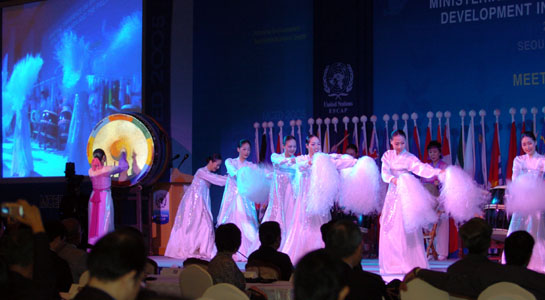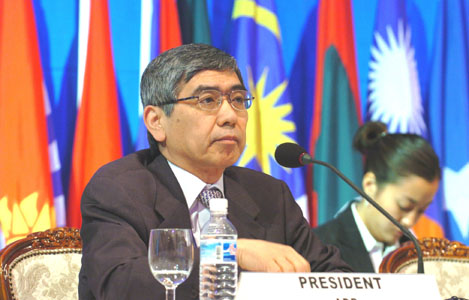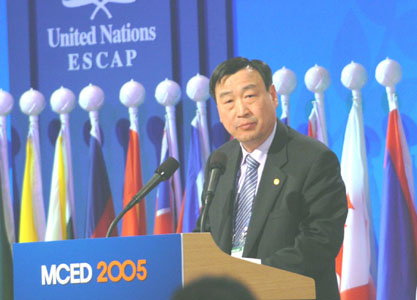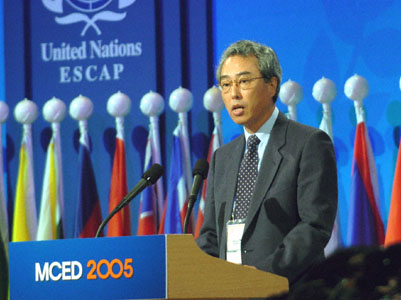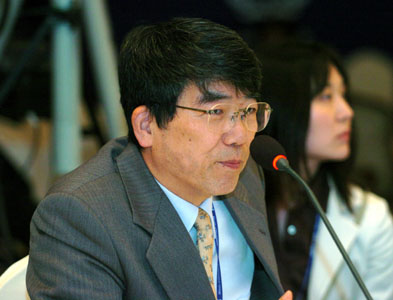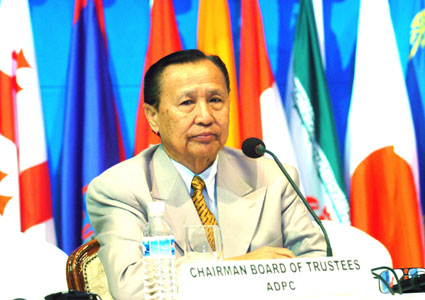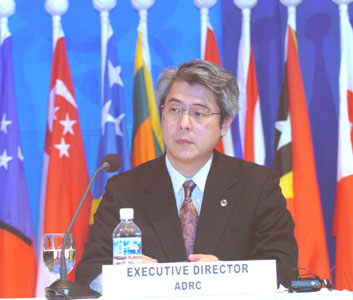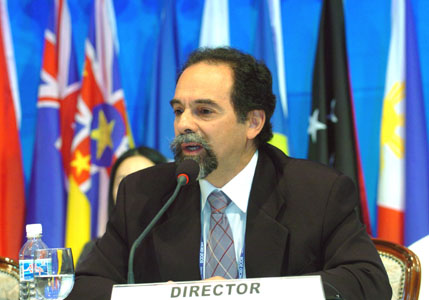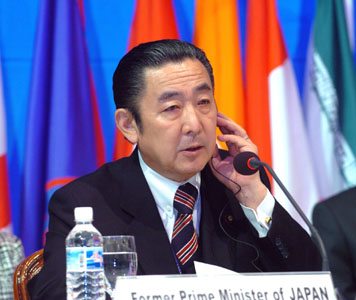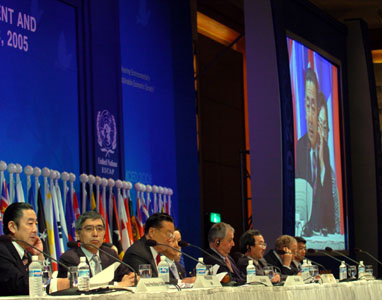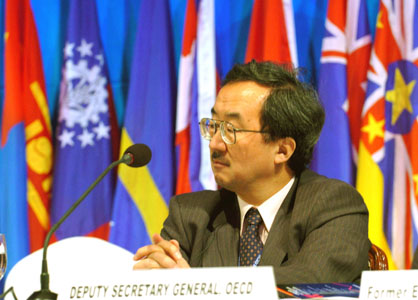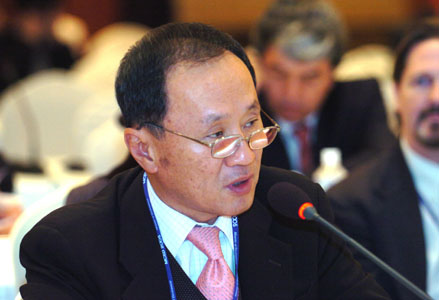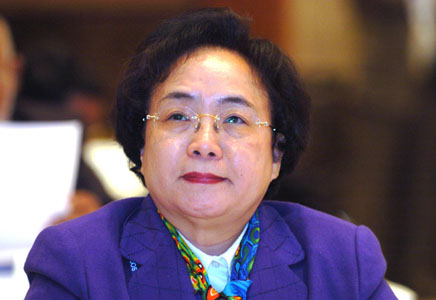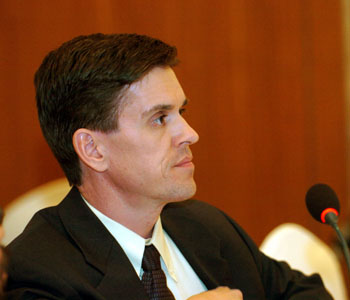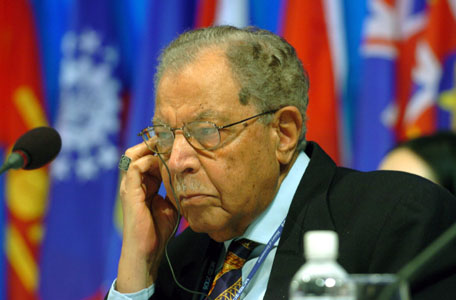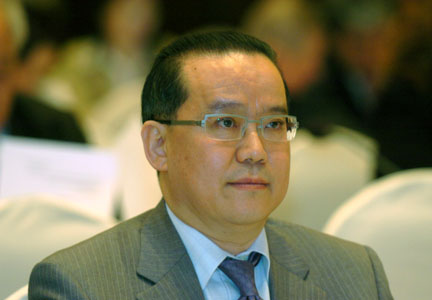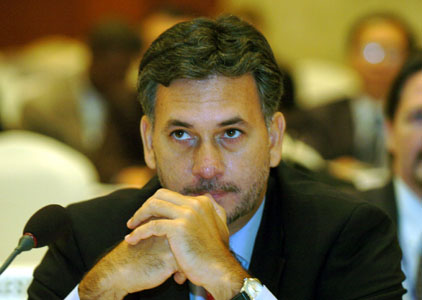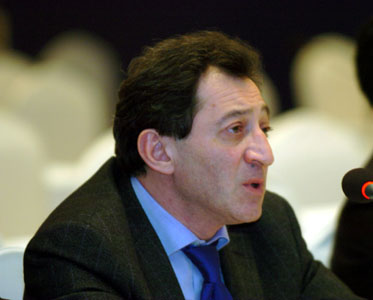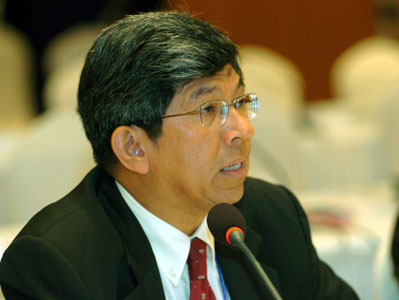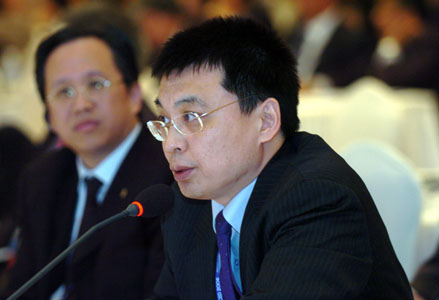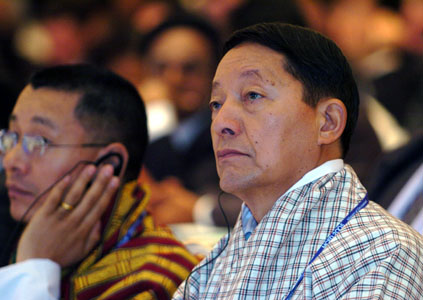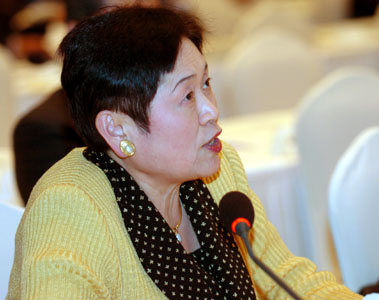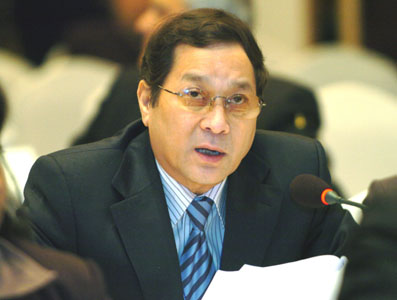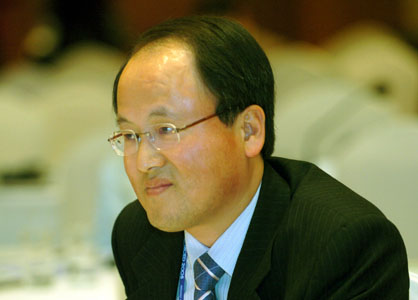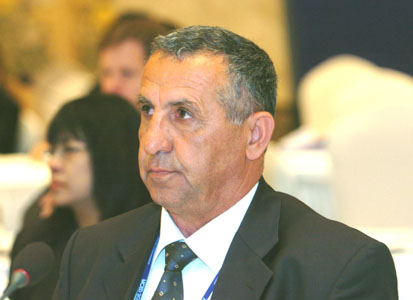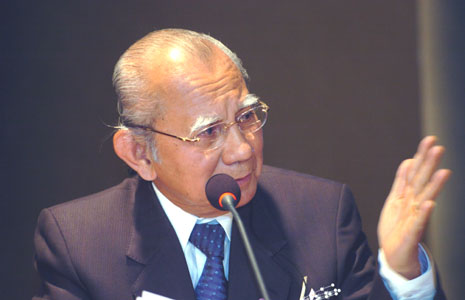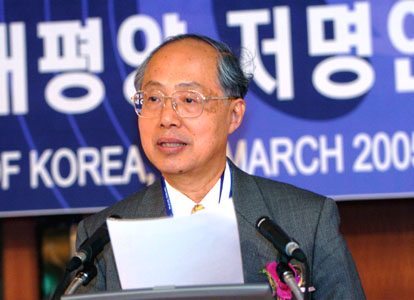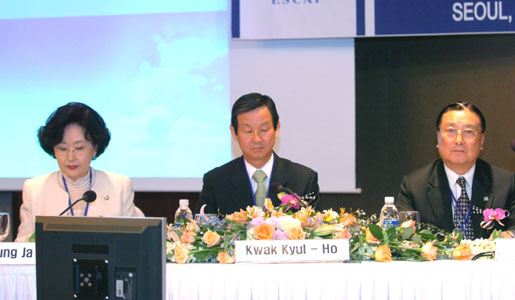|
|
|
||||||||||||||||||||||||||||||||||||||||||||
| ||||||||||||||||||||||||||||||||||||||||||||
|
|
||||||||||||||||||||||||||||||||||||||||||||
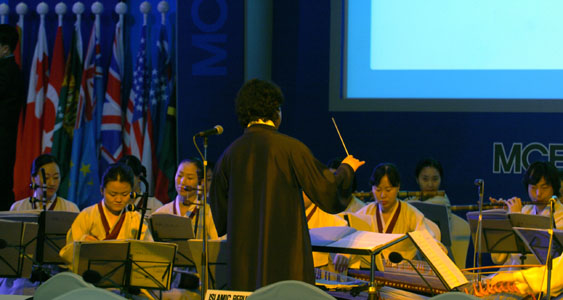 |
|
In his welcome address, Kyul-Ho Kwak,
Korean Minister of Environment, said that the
objective of the Conference is to find ways to
achieve a win-win situation for economic growth
and environmental sustainability, and called for
the world community to shift from a growth-oriented
approach to a new chapter of environmentally sound
economic growth. Hak-Su Kim, Executive Secretary of
ESCAP, delivered a message from Kofi Annan, UN
Secretary General, which highlighted the need for a
paradigm shift to green growth and called for
implementation of the Johannesburg Plan of
Implementation (JPOI) and other international
agreements to fulfill sustainable development. Kim
noted the record number of ministers responsible for
environment, planning, and finance attending this
conference and commended the role played by civil
society in addressing sustainable development
issues. In his inaugural address, H.E. Moo-hyun
Roh, President of the Republic of Korea,
stressed that economic growth without considering
sustainable development will cause adverse effects
to the environment. He said that his country is
turning from fast economic growth to green growth
and will become a benchmark for the region. |
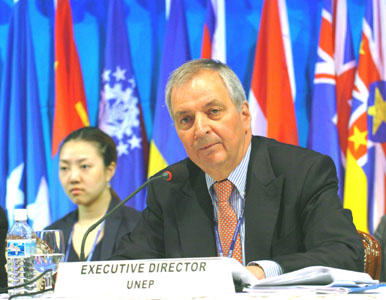 |
| Above photos L-R: Haruhiko Kuroda, President of ADB; Hee-Beom Lee; Shoji Nishimoto, Assistant Administrator of UNDP; Klaus Töpfer, Executive Director of UNEP |
|
Klaus
Töpfer, Executive Director of UNEP,
highlighted the importance of immediate
implementation of the Bali Strategic Plan for
Technology Support and Capacity Building recently
adopted at the 23rd session of the UNEP
Governing Council, as well as cooperation among UN
organizations to assist developing countries to
achieve green growth. Haruhiko Kuroda,
President of ADB, said that the Bank has adopted
environmental policies that focus on environmental
protection, integration of environmental policies
into economic growth, and fostering partnerships. Hee-Beom
Lee, Minister of Commerce, Industry and
Energy, Republic of Korea, said it is important to
encourage voluntary actions through incentives,
rather than imposing strict regulations, and to
strengthen international cooperation for the
adoption and commercialization of the Best
Available Technologies. Shoji Nishimoto,
Assistant Administrator of UNDP, said improving
environmental governance and strengthening linkage
between environment and poverty reduction are the
key for achieving green growth. Delegates elected
by acclamation the following officers of the
meeting: Kyul-Ho Kwak as chairperson; the 23
ministers attending the meeting as
vice-chairpersons; and W.R.M.S. Wickramasinghe,
Additional Secretary of Environment and Natural
Resources, Sri Lanka, as Rapporteur. Delegates
also adopted the provisional agenda (E/ESCAP/MCED(05)/L.1)
and the annotated provisional agenda (E/ESCAP/MCED(05)/L.2)
without amendments. |
Ministerial
Briefing on the Recent Tsunami and Regional Response
Strategy:
Hak-Su Kim
stressed the integration
of emerging issues from recent tsunami and other natural
disasters into sustainable development plans. He
stressed the need for, inter alia: implementation of the Hyogo Framework for Action; a community-based disaster risk management approach; and
capacity-building and awareness raising.
Sálvano Briceño, Director of UN
International Strategy for Disaster Reduction, briefed
participants on UN activities related to disaster reduction, in
particular: the UN's appeal for humanitarian response and
tsunami early warning; initiation of the international
strategy for disaster reduction; outcomes of the World
Conference on Disaster Reduction and the Hyogo Framework
for Action; and the "Living in Freedom" report to
the UN General Assembly.
Klaus Töpfer highlighted the environmental
impacts of tsunami and underscored that early warning
systems should be developed for all types of natural
disasters. Haruhiko Kuroda said the efficiency of
rehabilitation and reconstruction works can be increased
through improved assessment of impacts and enhanced
cooperation and coordination.
Krasae Chanawongse, Asian Disaster
Preparedness Center, Kingdom of Thailand, spoke on
community-based disaster risk management and stressed
the importance of community awareness and
community-based early warning and preparedness systems
based on precautionary measures.
Highlighting the economic and human losses from
disasters, Masayuki Kitamoto, Asian Disaster
Reduction Center, Japan, said disaster reduction must be
integrated into national development agendas. He also
stressed that awareness building is essential and
requires considerable efforts. Hideaki Oda, Japan
Water Forum, briefed on an appeal for "halving human
loss by water disasters by 2015" through effective
early warning.
| Above photos L-R: Hideaki Oda, Japan Water Forum; Krasae Chanawongse, Asian Disaster Preparedness Center, Kingdom of Thailand; Masayuki Kitamoto, Asian Disaster Reduction Center, Japan and Sálvano Briceño, Director of UN International Strategy for Disaster Reduction |
|
Roundtable
on Major Stakeholders: |
|
|
||
|
Reporting
from the Side Events: |
|
|
|
|
|
|
|
|
|
|
The Multistakeholder Forum for an
Equitable and Environmentally Sustainable Society
discussed next steps to put into practice
recommendations in the APFED final report. He also
delivered the APFED appeal to the MCED 2005. The Asia-Pacific Women's Conference on
Environment urged governments to, inter
alia: recognize the key role women play in
environmental sustainability; allocate resources
to support and strengthen women's capacity; and
create an enabling environment for women's
empowerment. |
|
|
||
|
|
||
|
|
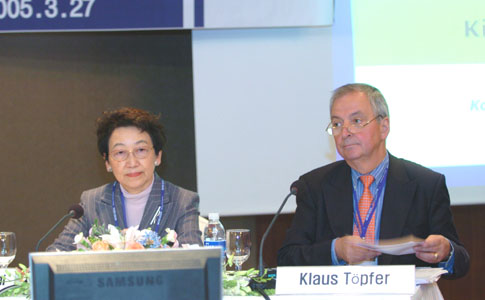 |
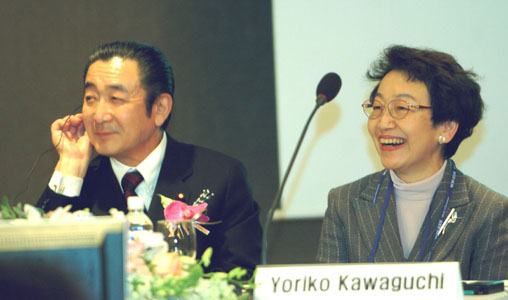 |
|
Above photos L-R: Myung-ja Kim, Korean National Assembly Member; Kyul-Ho Kwak, Korean Minister of Environment; Hak-Su Kim, ESCAP Executive Secretary; Yoriko Kawaguchi, Special Assistant to the Prime Minister of Japan; Klaus Töpfer, UNEP Executive Director; |
| Related Links |
|
|
|
|


